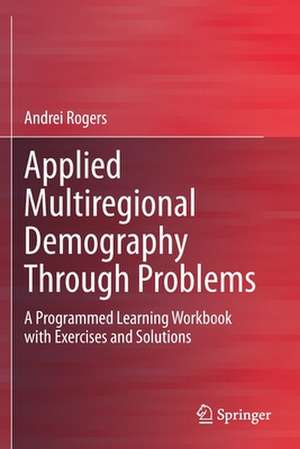Applied Multiregional Demography Through Problems: A Programmed Learning Workbook with Exercises and Solutions
Autor Andrei Rogersen Limba Engleză Paperback – 18 mar 2021
It extends the current developments in the spatial analysis of social data towards improving our understanding of dynamics and interacting change across multiple populations in space. Frameworks for analyzing such dynamics were first proposed in multiregional demography, over 40 years ago. This book revisits these methods and then illustrates how they may be used to analyze spatial data and study spatial population dynamics.
Topics covered include spatial population dynamics, population projections and estimations, spatial and age structure of migration flows and much more. As such this innovative textbook is a great teaching and learning tool for teachers, students as well as individuals who want to study demographic processes across space.
| Toate formatele și edițiile | Preț | Express |
|---|---|---|
| Paperback (1) | 381.00 lei 6-8 săpt. | |
| Springer International Publishing – 18 mar 2021 | 381.00 lei 6-8 săpt. | |
| Hardback (1) | 131.71 lei 3-5 săpt. | +24.80 lei 4-10 zile |
| Springer International Publishing – 18 mar 2020 | 131.71 lei 3-5 săpt. | +24.80 lei 4-10 zile |
Preț: 381.00 lei
Nou
Puncte Express: 572
Preț estimativ în valută:
72.90€ • 76.12$ • 60.20£
72.90€ • 76.12$ • 60.20£
Carte tipărită la comandă
Livrare economică 15-29 aprilie
Preluare comenzi: 021 569.72.76
Specificații
ISBN-13: 9783030382179
ISBN-10: 3030382176
Pagini: 154
Ilustrații: XIII, 154 p. 5 illus.
Dimensiuni: 155 x 235 mm
Greutate: 0.25 kg
Ediția:1st ed. 2020
Editura: Springer International Publishing
Colecția Springer
Locul publicării:Cham, Switzerland
ISBN-10: 3030382176
Pagini: 154
Ilustrații: XIII, 154 p. 5 illus.
Dimensiuni: 155 x 235 mm
Greutate: 0.25 kg
Ediția:1st ed. 2020
Editura: Springer International Publishing
Colecția Springer
Locul publicării:Cham, Switzerland
Cuprins
1 Uniregional Models With No Age Dependence.- 2 Spatial Population Dynamics: Location Without Age.- 3 Uniregional Population Dynamics: Age Without Location.- 4 Multiregional Population Dynamics: Age With Location.- 5 Multiregional Projection and Stable Growth.- 6 Birthplace-Specific Life Tables and Projections.- 7 The Spatial Patterns and Structures Of Migration.- A: Sample Datasets and Figures.- B: An Introduction To Matrix Algebra.
Notă biografică
Before his move to Colorado in 1983, the author spent eight years at the International Institute for Applied Systems Analysis (IIASA) in Laxenburg, Austria, where he headed a research program that addressed global human settlement problems and issues. He moved to Boulder, Colorado in 1983 to take on the job of Director of the Population Program, stepping down after 20 years in 2003. He is the author of twelve books on various aspects of population analysis. His current teaching and research interests revolve around the topics of immigration, internal migration, and population geographies.
In 2000, Professor Rogers received the Walter Isard Award for Distinguished Lifetime Scholarly Achievement from the North American Regional Science Association. In 2018 Professor Rogers was awarded the Mindel C. Sheps Award at the Population Association of America meeting. This award is given every two years for “outstanding contributions to demographic methodology” and is the world's highest recognition in formal demography.
In 2000, Professor Rogers received the Walter Isard Award for Distinguished Lifetime Scholarly Achievement from the North American Regional Science Association. In 2018 Professor Rogers was awarded the Mindel C. Sheps Award at the Population Association of America meeting. This award is given every two years for “outstanding contributions to demographic methodology” and is the world's highest recognition in formal demography.
Textul de pe ultima copertă
Written by the 2018 Mindel C. Sheps Award winner, this textbook offers a unique method for teaching how to model spatial (multiregional) population dynamics through models of increasing complexity. Each chapter in this programmed workbook starts with a descriptive text, followed by a sequence of exercises focused on particular multiregional models, of increasing complexity, and then ends with the solutions.
It extends the current developments in the spatial analysis of social data towards improving our understanding of dynamics and interacting change across multiple populations in space. Frameworks for analyzing such dynamics were first proposed in multiregional demography, over 40 years ago. This book revisits these methods and then illustrates how they may be used to analyze spatial data and study spatial population dynamics.
Topics covered include spatial population dynamics, population projections and estimations, spatial and age structure of migration flows and much more. As such this innovative textbook is a great teaching and learning tool for teachers, students as well as individuals who want to study demographic processes across space.
It extends the current developments in the spatial analysis of social data towards improving our understanding of dynamics and interacting change across multiple populations in space. Frameworks for analyzing such dynamics were first proposed in multiregional demography, over 40 years ago. This book revisits these methods and then illustrates how they may be used to analyze spatial data and study spatial population dynamics.
Topics covered include spatial population dynamics, population projections and estimations, spatial and age structure of migration flows and much more. As such this innovative textbook is a great teaching and learning tool for teachers, students as well as individuals who want to study demographic processes across space.
Caracteristici
Written by the 2018 Mindel C. Sheps Award winner Offers a programmed learning approach to students of the subject Includes exercises focusing on multiregional population models Identifies the key role played by migration
